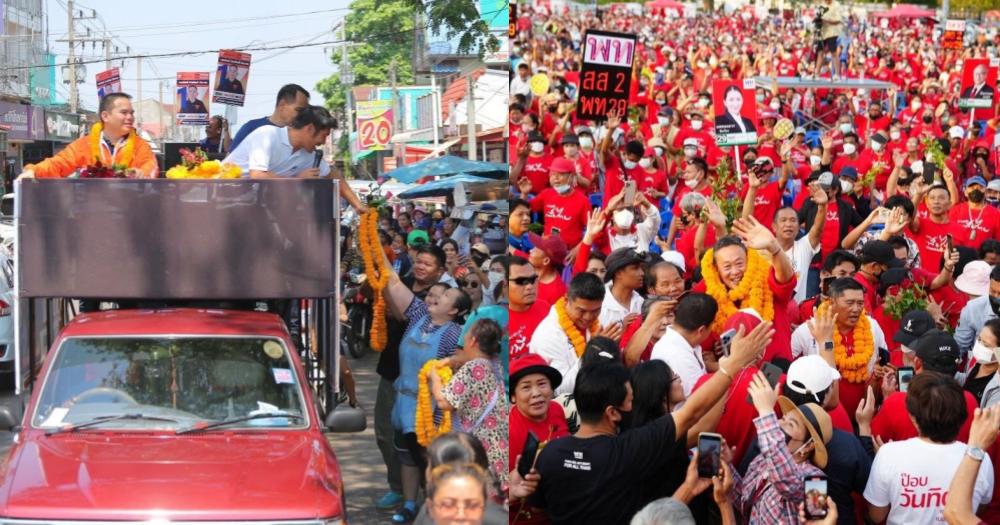Follow us on Telegram for the latest updates: https://t.me/mothershipsg
Thailand's opposition parties are currently more popular than the incumbent.
One, Pheu Thai, whose election campaign is led by Paetongtarn Shinawatra, is currently polling near 40 per cent for parliamentary seats.
The prime ministerial candidate of another opposition party, the Move Forward Party, is leading the polls as the public's preferred choice to lead the country after the May 14 general election.
But the format of Thailand's current electoral system means that both parties, both candidates, face a daunting task to become Thailand's leader in spite of their popularity.
Barriers to reentry
First past the post
Thailand's parliament is decided by two different methods, as described by Fulcrum.
First are 400 seats decided by First Past the Post vote, similar to how Single Member Constituencies are contested in Singapore.
Political parties contest a geographically defined constituency, and the party with the most votes for that area wins, even if they don't win a majority of votes.
Proportional representation
Second are 100 seats voted for with a separate ballot and distributed proportionally.
Thai voters will cast a second ballot for a particular political party, and if for example that party gets 35 per cent of the votes of this type, they'll get 35 seats.
This brings the total number of seats in Thailand's National Legislative Assembly to 500, and all 500 are up for grabs on May 14.
And under most parliamentary systems, winning 251 seats, half plus one, would be enough for a party or coalition to declare victory and be the one to nominate their candidate for the prime ministership.
Senate vote
But Thailand's Prime Minister is decided by the full parliament, which includes 250 members of the Senate, Thailand's upper house, for a total of 750.
In order for a party to win the Prime Ministership, a single bloc would need to win 376 seats, which represents half plus one of the total parliament, upper and lower houses included.
These 250 senators were mostly chosen by the coup-era National Council for Peace and Order, prior to Thailand reverting to an elected government, as described by Reuters in 2019.
In 2019, all 250 members voted as a single bloc for the the current PM Prayuth Chan-ocha, allowing him to become PM without having a majority in the lower house.
It is not clear if the senate will again vote as a bloc, but what is known is that their membership remains largely unchanged as the Thai senate sits for a six-year term that only expires in 2024.
This means for any opposition party to guarantee victory, they will need to win 376 seats in the May 14 election, a daunting task.
Machinations
This task is further complicated by a split in the opposition. On one side is the Pheu Thai party, headed by Paetongtarn Shinawatra.
Her father and aunt, Thaksin and Yingluck Shinawatra, were both elected PM and each were deposed by a military coup.
Thaksin was removed from power in 2006, and Yingluck in the 2014 coup that would eventually make Prayuth PM.
And while Prayuth was quoted by the Bangkok Post as assuring the country that there will not be another coup, his wording, or translation of his wording, made it unclear whether he meant the military had no appetite for a coup, or whether they'd simply prevent the need for a coup, perhaps by having the senate vote in a bloc again and preventing a new Shinawatra government.
Move Forward Party
On the other side of the Thai opposition is the Move Forward Party (MFP), which is a reformist, progressive party, popular with Thailand's youth.
It is the offspring of the now defunct Future Forward Party, which was dissolved in 2020, after having been declared to have taken an illegal loan, according to the BBC.
Its leader, Pita Limjaroenrat is leading polling on preference for prime minister, although Paetongtarn 's party is highly favoured to win in the race for parliamentary seats, as shown in polling quoted by Bloomberg.
While PM polling may be flattering, it appears that the seat polling will end up being more telling.
While both parties are not exactly hostile to each other, they are not allies either, with MFP's popularity seemingly coming at the expense of Pheu Thai, as opposed to the government/military aligned parties.
Will a deal be made?
This uncertainty has led to speculation that one of the two opposition parties will cut a deal with one of the military aligned parties, paving the way for their PM candidate to assume the mantle of government, as outlined by this essay in Fulcrum.
But both parties have said they will not do this, with MFP saying so directly and being quoted by the Bangkok Post as saying they were open to working with Pheu Thai, but only after the election was over.
Paetongtarn was more colourful, quoted by the Bangkok Post as saying: "Look at this face, this is the face that doesn't like coups."
But in Southeast Asian politics, parties that seemed unlikely bedfellows have found their way into the same cabinets.
The most recent Southeast Asian election, 2022's Malaysian GE saw Pakatan Harapan come together with Barisan Nasional, forming a coalition that many thought they would never see in their lifetimes.
In Indonesia, President Joko Widodo welcomed his perennial opponent Prabowo Subianto into his own government, even appointing him defense minister.
If someone were to have said that the chance of a Shinawatra working with a military aligned government was as likely as Malaysia's Pakatan working with Barisan, it would have been easy to find agreement until late last year.
Now it feels much more possible than before.
You may also be interested in
Related Stories
Top image via พรรคก้าวไกล - Move Forward Party/Facebook & พรรคเพื่อไทย/Facebook
If you like what you read, follow us on Facebook, Instagram, Twitter and Telegram to get the latest updates.
